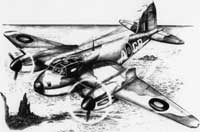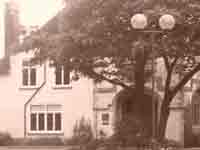
POLITICAL WARFARE EXECUTIVE
In the press cutting and filing library at Woburn, the P.W.E. had by now amassed so much information on the Germans, through a variety of sources, that a significant reason for the move was to allow the use of the library by the B.B.C., which had a separate News Information Bureau in Bush House. At the end of February, 1942, Brooks and Lockhart moved their sections accordingly from Fitzmaurice Place and the Foreign Office to accommodation directly above the European service of the B.B.C. in Bush House where - for the first fortnight - the staff existed mainly on a menu of coffee and kippers! More precisely the move by Lockhart to Bush House had begun on Friday 27th February, 1942, ready for him to begin work at 9am the following Monday. Far more spacious than the Locarno quarters, his new offices consisted of a few small rooms and one large central hall, where all the staff could remain under the watch of the management. This space Lockhart converted into cubicles and to meet the requirements of the security officer, the entrances from the lifts were wired with heavy netting. Here Lockhart remained until the end of the war, conducting most of his work by telephone and towards this end he had two phones on his desk, a house phone with switches to all the chief officials of his department and a private line to his bedroom, in his club in St James Square.

For most of the war the 'Wooden Wonder' was the fast aircraft in the skies. As a light bomber this made it ideal for 'nuisance raids' , staged for propaganda effects. They were used to fly newspapers and magazines to England from Sweden, smuggled in from occupied countries.
By the move to Bush House, P.W.E. now had better control over policy as agreed by the B.B.C. governors and indeed, in order to win the confidence of the B.B.C., in March Lockhart made Ivone Kirkpatrick a member of the P.W.E. Executive Committee. He had been appointed Foreign Advisor to the B.B.C. in February, 1941 and had a first hand knowledge of the German leaders, through being First Secretary in Berlin, before the war. For this reason he had been sent to identify and interview Hess in May, 1941.
Determining policy
Under the new P.W.E. structure, the former fortnightly meetings of the two committees of ministers and officials were abolished. Instead, Lockhart dealt directly with Eden and Bracken and although Lockhart gave political guidance and situation forecasts, the actual propaganda was planned and executed by his regional directors and by the planning section. Special occasions were also organised, such as a Berlin raid by fast, light bombers on the 10th anniversary of the Nazis coming to power. Celebrations were thereby delayed for over an hour.
Soon after settling in at Bush House, in the company of Bracken, Ronald Tree, of the Ministry of Information and Lord Birkenhead, Lockhart travelled to Woburn in Bracken's Bentley on Tuesday 31st. March, 1942, in accordance with Bracken's desire to visit the establishment. Being a wet and miserable morning, their inspection began with the Abbey where, with Leeper as the guide, in the large rooms and picture galleries the main offices of the country section were accommodated. However, Bracken showed a decidedly greater enthusiasm for the art treasures but became increasingly interested at Marylands and Wavendon Towers, respectively in the production unit and the black broadcasting. Particularly the quality of the voices of the various announcers impressed him, which he thought more effective and virile than those of the B.B.C. Dinner was then taken at the Old Rectory, Woburn and being concerned with the distance from London and the consequent high petrol consumption, he spoke to Lockhart on the way back in the car saying that all the country establishment, except the officials in the really secret activities, must be brought back to London. This would reduce the use of fuel by a half and he promised to do all

Here the recording studios were situated. Boxes of redundant records would be transferred to the pigeon loft at Woburn Abbey. Despite a no smoking rule, one R.U. became notorious for leaving cigarette butts and smoke in the studio.